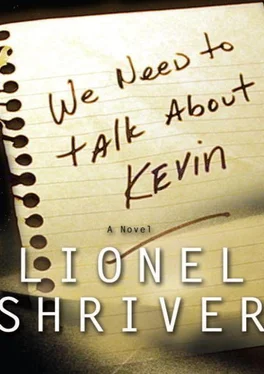After a few minutes, a large, plump woman flew through the reception room door, swooping down on Joshua and lifting him in a single motion into her arms. “Joshua!” she cried. At first limp in her clasp, gradually those muscular-dystrophy wrists curled around her shoulders. His shirtsleeves left red smears on her ivory raincoat. The small face buried in her ample neck. I was simultaneously moved, and jealous. This was the reunion that I’d been denied. I love you so much! I’m so, so relieved you’re all right! Me, I was no longer entirely relieved that our own son was all right . From my glance in that car window, it was his very seeming all right ness that had begun to torment me.
The trio shuffled through the inside door. The officer behind the reception window ignored me. If at wit’s end, I was probably grateful for my little task with the mobile, which I worried like a rosary; dialing gave me something to do. If only for variety, I switched to trying our home phone for a while, but I kept getting the machine, and I’d hang up in the middle of that stilted recording, hating the sound of my own voice. I’d already left three, four messages, the first controlled, the last weeping—what a tape to come home to. Realizing that we were both running late, Robert had obviously taken Celia to McDonald’s; she loved their hot apple pies. Why didn’t he call me? He had my mobile number! Hadn’t Robert listened to the news? Oh, I know, McDonald’s broadcasts Muzak, and he wouldn’t necessarily switch on his car radio for such a short trip. But wouldn’t someone mention it while standing on line? How could anyone in Rockland County be talking about anything else?
By the time two officers fetched me into that plain little room to take my statement, I was so distraught that I was less than polite. I probably sounded thick, too; I couldn’t see the purpose of contacting our family’s lawyer when there didn’t appear to be any question that Kevin did it. And this was the first time that anyone had seen fit to give his mother even the sketchiest lowdown on did what . The casualty estimates that one officer rattled off matter-of-factly would later prove exaggerated, but back then I’d had no reason to have researched the fact that atrocity figures are almost always inflated when first released. Besides, what is the difference, really, between bearing a son who murders only nine people instead of thirteen? And I found their questions obscenely immaterial: how Kevin did in school, what had he been like that morning.
“He was a little testy with my husband! Otherwise, nothing special! What was I supposed to do, my son was rude to his father, so I call the police?”
“Now, calm down Mrs. Kachourian—”
“Khatchadourian!” I insisted. “Can you please get my name right?”
Oh, they would.
“Mrs. Khadourian , then. Where might your son have gotten that crossbow?”
“It was a Christmas present! Oh, I told Franklin it was a mistake, I told him. Can I please call my husband again?”
They allowed the call, and after another fruitless redial, I wilted. “I’m so sorry,” I whispered. “I’m so sorry, I’m so sorry. I didn’t mean to be unkind to you, I don’t care about my name, I hate my name. I never want to hear my name again. I’m so sorry—”
“Mrs. Khadarian—” One officer patted my shoulder gingerly. “Maybe we should take a full statement another time.”
“It’s just, I have a daughter, a little girl, Celia, at home, could you—”
“I understand. Now, I’m afraid Kevin’s going to have to stay in custody. Would you like to speak to your son?”
Picturing that smarmy, implacable expression of serenity I met through the police car window, I shuddered, covering my face with my hands. “No. Please, no,” I begged, feeling an awful coward. I must have sounded like Celia, imploring weakly not to be forced to bathe when there was still all that dark, sticky horror lurking in the bathtub trap. “Please don’t make me. Please don’t. I couldn’t face him.”
“Then maybe it would be best for now if you just went on home.”
I stared at him stupidly. I was so ashamed, I honestly believed they were going to keep me in jail.
If only to fill the awkward silence as I just looked at him, he added gently, “Once we get a warrant, we will have to search your house. That’ll probably be tomorrow, but don’t you worry. Our officers are very respectful. We won’t turn the place upside down.”
“You can burn that house for all I care,” I said. “I hate it. I’ve always hated it—”
The two looked at each other: hysterical . And they ushered me out the door.
Freed—I couldn’t believe it—out in the parking lot, I wandered desolately past my car, failing to recognize it the first time down the row; everything in what was already my old life had grown alien. And I was dumbfounded. How could they just let me go? Even at this early juncture I must have begun to feel a deep need to be brought to book, to be called to account. I had to stop myself from pounding on the station door and importuning reception to please let me spend the night in a cell. Surely I belonged there. I was convinced that the only pallet on which I would be able to lie peacefully that night would be a cheap, lumpy mattress with a scratchy institutional sheet, and the only lullaby that could possibly sing me to sleep would be the grit of cordovans on concrete and the distant clink of keys.
Yet once I found the car I became strangely calm. Sedate. Methodical. Like Kevin. Keys. Lights. Seat belt. Windshield wipers on interval, for there was a thin mist. My mind went blank. I ceased talking to myself. I drove home very slowly, braking on yellow, coming to a legally complete halt at the four-way stop, though there was no other traffic. And when I curved up our long drive and noticed that none of the lights were on, I thought nothing of it. I preferred not to.
I parked. Your truck was in the garage. I moved very slowly. I turned off the wipers, and the lights. I locked the car. I put the keys in my Egyptian bag. I paused to think of some other small everyday thing I needed to take care of before walking in the house; I picked a leaf off the windscreen, scooped your jump rope off the garage floor and hung it on its hook.
When I turned on the light in the kitchen, I thought how unlike you it was to have left all those greasy breakfast dishes. The skillet for your sausage was upright in the drainer, but not the one for the French toast, and most of the plates and juice glasses were still on the counter. Sections of the Times splayed on the table, though taking the paper out to the stack in the garage every morning was one of your neatnik obsessions. Flicking the next light switch, I could see at a glance that no one was in the dining room, living room, or den; that was the advantage of a house with no doors. Still I walked through every room. Slowly.
“Franklin?” I called. “Celia?” The sound of my own voice unnerved me. It was so small and tinny, and nothing came back.
As I advanced down the hall, I paused at Celia’s bedroom and had to force myself to walk in. It was dark. Her bed was empty. The same, in the master bedroom, the bathrooms, out on the deck. Nothing. Nobody. Where were you? Had you gone looking for me? I had a mobile. You knew the number. And why wouldn’t you have taken the truck? Was this a game? You were hiding, giggling in a closet with Celia. This of all nights you chose to play a game?
The house was empty. I felt a surging, regressive urge to call my mother.
I walked through it twice. Though I had checked the rooms before, the second time through I felt only deeper trepidation. It was as if there were someone in the house, a stranger, a burglar, and he was just out of view, stalking behind me, ducking under cabinets, clutching a cleaver. Finally, shaking, I returned to the kitchen.
Читать дальше












